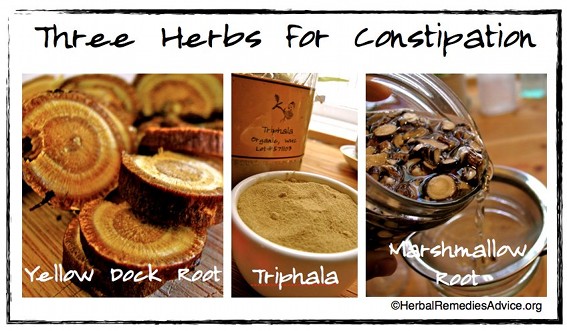Get weekly tips, recipes, and my Herbal Jumpstart e-course! Sign up for free today.

Constipation Home Remedy
Share this! |
|
|
You don’t have to live with chronic constipation! I am always amazed to work with people who have been dealing with constipation for years. Some people think irregular bowel movements aren’t a big deal and so they never make time to address it. Others have tried some constipation home remedy but they didn’t get the results they were looking for (and you’ll see why in this article). |
When people start searching for some constipation home remedy they’ll often ask, “What herb/remedy is good for constipation?” This is a reflection of the world we live in, which often gives a standard treatment for a disease: if you have a tummy ache take pepto bismal; got a headache?.. take ibuprofen.
That is rarely how traditional forms of healing work. Instead, we want to know the reason the person has the symptom. In this way we work with the person instead of simply masking symptoms of a disease.
Severe constipation is a great example of why this holistic healing paradigm is often more effective in the long run than standard western medicine. This is also why there are no “best constipation herbs” or no "best constipation home remedy". Instead, we want to match the herbs to the person, not to the disease (in this case severe constipation).
There are many different causes of constipation and so before addressing the symptom we need to know the cause. In this article we will first look at constipation from a western medicine perspective and then broaden our scope to a more holistic understanding so you can find a constipation home remedy that will work for you specifically.
Constipation Symptoms
Constipation can be defined in several ways. Most simply it refers to the abnormal passage of the bowels. Common constipation symptoms are infrequency of bowel movements, straining upon defecating, or even an incomplete passage of the bowels. Bloating, gas and pain can also accompany constipation. Ideally, bowel movements should pass without straining 1-3 times a day, be well formed and be a dark brown color (but color may change temporarily due to dietary intake such as beets).
Note that some western practitioners will state that a bowel movement at least once every three days is fine. In my opinion that is far too long!
You can read more about the digestive system anatomy here.
Causes of Constipation
Digestion is the cornerstone to health in every form of traditional medicine that I have studied. Having regular and easy-to-pass bowel movements is an important sign of health.
If you are looking for a natural remedy for constipation or for some constipation home remedy, the most important thing to do is to figure out why you are constipated.
Constipation can be caused by a variety of reasons. It is always important to figure out the why in order to fully address and resolve this problem. Some things to consider are:
- diet (lack of fiber, too much processed foods, too much dairy)
- lack of exercise
- pharmaceutical drugs
- dehydration
- stress
- various diseases (hypothyroidism, colon cancer, parkinson’s)
- reliance on laxatives
- traveling
- resisting the initial urge to defecate
- nutrient deficiencies
- lack of digestive fire/tone
- atonic or flaccid bowels
- hypertonic bowels (spastic bowels)
Western medicine constipation treatment
Traditional medicine and western medicine agree that the best treatment for constipation is a high fiber diet, plenty of water intake and exercise. If this isn’t helping, then fiber supplements like psyllium are used or over-the-counter laxatives like milk of magnesia. For constipation caused by pharmaceutical drugs or diseases, more aggressive medications may be used.
Constipation Home Remedy
As stated above, diet and exercise are the most important ways to address constipation. I recommend a diet high in vegetables and non-sugary fruits such as blueberries and raspberries as well as regular exercise that is appropriate for the individual. Regular water intake and the avoidance of dehydrating beverages is also important. Addressing these issues first is a good course of action.
In this next section we’ll look at home remedies for constipation to address some of the causes of constipation that are listed above.
Atonic or flaccid bowels
This is usually seen in the elderly or sedentary population. Basically the peristaltic action of the bowels is weak and so the feces is unable to move through the intestines. In this scenario cathartic laxatives may be used in the short term to provide more tone to the bowels. Bitter herbs and foods will also be important to increase peristaltic action. Soluble fiber and magnesium for constipation can help to keep the bowel soft and easier to pass.
Hypertonic bowels
This is generally seen in younger folks who may have an uptight personality, or who have regularly resisted the first urge to poop. Here we need to use the opposite methods than in the hypotonic bowels. Antispasmodic herbs and relaxing nervines can reduce some of the spastic tissues of the bowels, resulting in an easier passage.
Further differential diagnosis can be made based on the quality of the feces. Do you have dry, hard stools, or thick pasty stools or is there mucus present? (I know this sounds odd, but herbalists spend a long time studying different types of feces. It is a great diagnostic tool!)
Foods for Constipation
There are foods that cause constipation and foods that relieve constipation. The foods that cause constipation can be different for everyone. I’ve seen common food intolerances such as soy, gluten and dairy cause constipation in individuals. Eating an imbalanced diet high in meats and dairy with little soluble and insoluble fiber can easily cause constipation in anyone!
Plenty of fibrous vegetables, carrots, cabbage, brussel sprouts, green leafy vegetables are great foods for constipation. Fruits can also help to move the bowels, although don’t overdo it on fruits high in sugar. Berries and possibly apples are a good choice.
Prunes are famous for producing a bowel movement. You can eat prunes whole or use prune juice for constipation.
Pro-biotics are generally needed by those with severe constipation. In food form these include yogurt and raw fermentations of miso, kim chi, sauerkraut, etc. Pro-biotics can also be taken in supplement form but it is really really important to get a good supplement. Many on the store shelves are inert and a waste of money!
Herbs for Constipation
Triphala is a famous ayurvedic formula that is made of three dried and powdered fruits. It gently addresses some types of constipation. The dosage is different for everyone and an experienced practitioner can formulate this specifically (using more of one fruit or another) for an individual.
Bitter herbs for constipation
The bitter taste supports the entire digestive process, creating a cascade of events such as digestive enzyme secretion, bile production and secretion, and peristalsis. I first recommend that a person include bitter foods in their diet. If that is not possible then a well-formulated digestive herbal bitters blend that they take before meals will also work well.
Carminative herbs for constipation
These herbs are generally warming and help to encourage digestive fire. They can be added liberally to meals (the plus side is they taste great!)
Bulk Laxatives
These need to be taken with plenty of water. I generally suggest people start with a small amount and generally increase the dosage. Examples include flaxseed and psyllium husk.
Demulcent herbs for constipation
Demulcent or mucilaginous herbs can soothe inflammation of the bowels to help reduce irritation. Many demulcent herbs gently loosen the bowels as well.
Cathartic herbs for constipation
I rarely use this category of herbs and when I do recommend them it is for a short period of time only since you can easily become habituated to them. These herbs for constipation often have anthraquinones in them. These can cause a bowel movement within 2 - 6 hours but if they are taken in excess or not taken within the right formulation they can also cause cramping and pain.
Supplements
Magnesium for constipation - magnesium deficiency can be a cause of constipation. Taking too much magnesium leads to loose stools, so I generally recommend that people start with a low amount and then slowly increase until regular but solid bowel movements are found.
Lifestyle
A sedentary lifestyle can also lead to constipation. If you have been sedentary for a long time it’s important to find exercise that is appropriate for you. Even gentle exercise such as walking can help bring regularity to the bowels.
Negative and excessive stress can also lead to constipation. Lifestyle changes and relaxing nervine herbs and adaptogen herbs can be a great constipation home remedy to address this. You can read more about how to reduce stress and maintain a healthy nervous system here.
Summary
There are many safe and effective examples of constipation home remedy. But rather than just throw everything but the kitchen sink at your bowels in a desperate attempt to temporarily relieve severe constipation, it is far more efficient to understand why your bowels are not moving optimally and then address the root cause. Lifestyle changes, food choices and herbs can all be combined to create vibrant digestive health. And because digestion is so important to overall health I highly recommend you address your chronic (or acute) bowel problems.

Rosalee is an herbalist and author of the bestselling book Alchemy of Herbs: Transform Everyday Ingredients Into Foods & Remedies That Healand co-author of the bestselling book Wild Remedies: How to Forage Healing Foods and Craft Your Own Herbal Medicine. She's a registered herbalist with the American Herbalist Guild and has taught thousands of students through her online courses. Read about how Rosalee went from having a terminal illness to being a bestselling author in her full story here.


